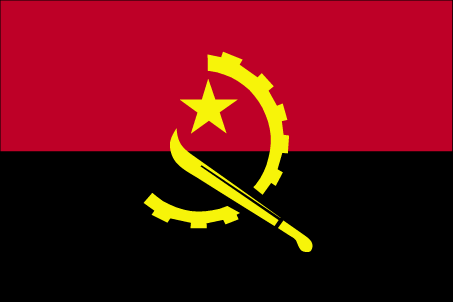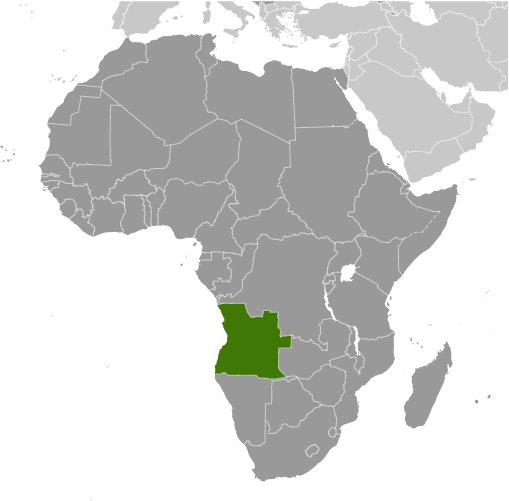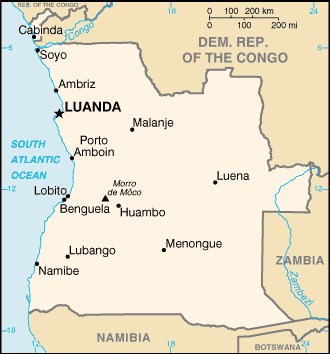Angola is rebuilding its country after the end of a 27-year civil war in 2002. Fighting between the Popular Movement for the Liberation of Angola (MPLA), led by Jose Eduardo DOS SANTOS, and the National Union for the Total Independence of Angola (UNITA), led by Jonas SAVIMBI, followed independence from Portugal in 1975. Peace seemed imminent in 1992 when Angola held national elections, but fighting picked up again by 1996. Up to 1.5 million lives may have been lost - and 4 million people displaced - in the quarter century of fighting. SAVIMBI's death in 2002 ended UNITA's insurgency and strengthened the MPLA's hold on power. President DOS SANTOS held legislative elections in September 2008 and, despite promising to hold presidential elections in 2009, has since made a presidential poll contingent on the drafting of a new constitution.
Country Name
Conventional long form:Republic of Angola
Conventional short form: Angola
Local long form:Republica de Angola
Local short form:Angola
Former:People's Republic of Angola
Government Type
republic; multiparty presidential regime
Capital
Name:Luanda
Geographic coordinates:8 50 S, 13 14 E
Time difference:UTC+1 (6 hours ahead of Washington, DC during Standard Time)
Administrative divisions
18 provinces (provincias, singular - provincia); Bengo, Benguela, Bie, Cabinda, Cuando Cubango, Cuanza Norte, Cuanza Sul, Cunene, Huambo, Huila, Luanda, Lunda Norte, Lunda Sul, Malanje, Moxico, Namibe, Uige, Zaire
Independence
11 November 1975 (from Portugal)
National Holiday
Independence Day, 11 November (1975)
Constitution
adopted by People's Assembly 25 August 1992
Legal system
based on Portuguese civil law system and customary law; modified to accommodate political pluralism and increased use of free markets; has not accepted compulsory ICJ jurisdiction
Suffrage
18 years of age; universal
Executive branch
Chief of state: President Jose Eduardo DOS SANTOS (since 21 September 1979); note - the president is both chief of state and head of government
Head of government:President Jose Eduardo DOS SANTOS (since 21 September 1979); Antonio Paulo KASSOMA was named prime minister by MPLA on 26 September 2008
Cabinet: Council of Ministers appointed by the president
(For more information visit the World Leaders website)
Elections:president elected by universal ballot for a five-year term (eligible for a second consecutive or discontinuous term) under the 1992 constitution; President DOS SANTOS was selected by the party to take over after the death of former President Augustino NETO(1979) under a one-party system and stood for reelection in Angola's first multiparty elections on 29-30 September 1992 (next were to be held in September 2009 but have been postponed)
Election results:Jose Eduardo DOS SANTOS 49.6%, Jonas SAVIMBI 40.1%, making a run-off election necessary; the run-off was never held leaving DOS SANTOS in his current position as the president
Legislative branch
unicameral National Assembly or Assembleia Nacional (220 seats; members elected by proportional vote to serve four-year terms)
Elections:last held on 5-6 September 2008 (next to be held in September 2012)
Election results:percent of vote by party - MPLA 81.6%, UNITA 10.4%, PRS 3.2%, ND 1.2%, FNLA 1.1%, other 2.5%; seats by party - MPLA 191, UNITA 16, PRS 8, FNLA 3, ND 2
Judicial branch
Supreme Court and separate provincial courts (judges are appointed by the president)
Political Parties and Leaders
National Front for the Liberation of Angola or FNLA [Ngola KABANGU]; National Union for the Total Independence of Angola or UNITA [Isaias SAMAKUVA] (largest opposition party); New Democracy Electoral Union or ND [Quintino de MOREIRA]; Popular Movement for the Liberation of Angola or MPLA [Jose Eduardo DOS SANTOS] (ruling party in power since 1975); Social Renewal Party or PRS [Eduardo KUANGANA]
note: nine other parties participated in the legislative election in September 2008 but won no seats
Political pressure groups and leaders
Front for the Liberation of the Enclave of Cabinda or FLEC [N'zita Henriques TIAGO, Antonio Bento BEMBE]
note: FLEC's small-scale armed struggle for the independence of Cabinda Province persists despite the signing of a peace accord with the government in August 2006
International organization participation
ACP, AfDB, AU, CPLP, FAO, G-77, IAEA, IBRD, ICAO, ICCt (signatory), ICRM, IDA, IFAD, IFC, IFRCS, ILO, IMF, IMO, Interpol, IOC, IOM, IPU, ISO (correspondent), ITSO, ITU, ITUC, MIGA, NAM, OAS (observer), OPEC, SADC, UN, UNCTAD, UNESCO, UNIDO, Union Latina, UNWTO, UPU, WCO, WFTU, WHO, WIPO, WMO, WTO
Diplomatic representation in the US
Chief of mission:Ambassador Josefina Perpetua Pitra DIAKITE
Chancery:2108 16th Street NW, Washington, DC 20009
Telephone:[1] (202) 785-1156
FAX:[1] (202) 785-1258
Consulate(s) general:Houston, New York
Diplomatic representation from the US
Chief of mission: Ambassador Dan MOZENA
Embassy: number 32 Rua Houari Boumedienne (in the Miramar area of Luanda), Luanda
Mailing address:international mail: Caixa Postal 6468, Luanda; pouch: US Embassy
Telephone: [244] (222) 64-1000
FAX:[244] (222) 64-1232
Flag description
two equal horizontal bands of red (top) and black with a centered yellow emblem consisting of a five-pointed star within half a cogwheel crossed by a machete (in the style of a hammer and sickle); red represents liberty, black the African continent, the symbols characterize workers and peasants



















